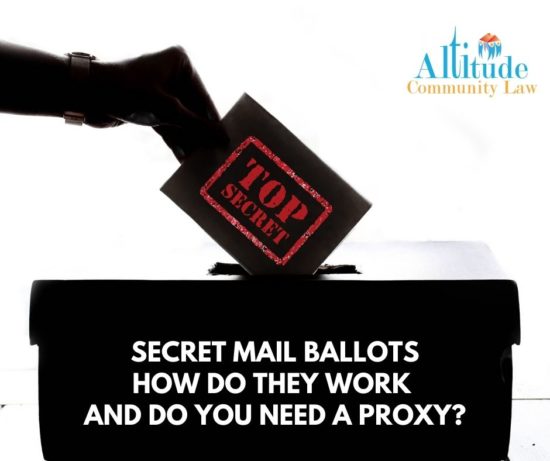
In a world of COVID-19, virtual meetings, and tensions still running high in many associations, members are more eager than ever to participate in the democratic process of the association. With the increased desire of members to participate, and in conjunction with virtual meetings, comes the inevitable questions of how do proxies work, when are they appropriate, and what do you do with proxies when a virtual board election becomes contested. I am glad you asked. Colorado law has two specific processes for carrying out a vote: (1) in person voting with the use of proxies (which also applies at a virtual meetings); or (2) mail ballots without proxies (which may become necessary when a board election becomes contested at a virtual meeting).
Proxies:
Proxies may be used at both virtual and physical meetings but, as stated above, are not used when voting via written ballot. A proxy is defined as a written document provided by a member of an association to another individual providing such individual with the ability and power to vote on behalf of such member. Proxies are beneficial when meetings are held, and members are unable to attend. Executing a proxy allows the member who is physically (or virtually) unable to attend the meeting to be represented by another person. This has the effect of allowing the absent member to count for quorum and have a voice at the meeting, to be exercised by the proxy holder.
Action by Mail Ballot:
Any action that may be taken at a meeting of members, may be taken by written ballot as long as written ballot process complies with the Colorado Revised Nonprofit Corporation Act. Colorado law contains specific and clear requirements setting forth the information that must be included when voting via written ballot.
Pursuant to the Nonprofit Act, every association member must be provided with enough information regarding the subject of the vote to make an informed decision on how to vote.
Additionally, written ballots must allow members to vote either for or against the proposed measure, with the exception election ballots, which only need to list the candidates. The ballot solicitation letter must also contain a deadline for the ballot to be received in order to be counted, the number of approvals needed for the measure to pass (or director to be elected), and quorum requirements.
In addition to the statutory written ballot requirements outlined above, contested elections, where there are more candidates running than open positions, require the use of secret ballots. Ensuring a written ballot is secret requires the use of multiple envelopes (an envelope for mailing the packet of information, a privacy envelope, and a self-addressed/stamped return envelope (which is not required but recommended)).
Again, proxies cannot be used when taking action via written ballot (whether secret or not) as each and every member is provided with the above information and has an opportunity to vote on the ballot provided.
Unless an association has purchased software allowing secret voting during a virtual meeting (there are some platforms that allow secret voting while the virtual meeting is occurring), if an election becomes contested during a virtual meeting, the board should advise its members that because a secret ballot vote is now required, the vote must be conducted using a written ballot process because it is not possible to have a secret vote during the virtual meeting itself.
It is important to note that if the association is required to conduct a written ballot election, such voting will constitute a completely separate legal process from the meeting. This means written ballots will need to be provided to all owners in the community and not just those owners who attended the meeting. Furthermore, any proxies provided for the virtual meeting cannot be utilized with respect to the written ballot process for reasons discussed earlier in this article.
Confusion between Mail Ballots and Proxies:
Oftentimes there is confusion about the difference between proxies and written ballots. Proxies are utilized when a physical or virtual meeting is being held and a member is unable to attend. That member may, but is not required to, designate another individual as their proxy. A member’s proxy will count towards quorum, and the proxy holder will have the authority to vote or act on behalf of the proxy giver. A proxy is not a ballot and the proxy holder must be provided with a physical ballot in exchange for the proxy at the meeting.
Conversely, an action by written ballot, secret or otherwise, cannot include a proxy because each owner has the ability to “participate” in the decision by casting his/her/their ballot during the allotted voting period.
For more information, or if you have questions concerning written ballots and/or proxies, please contact an Altitude attorney at 303.432.9999 or at [email protected].